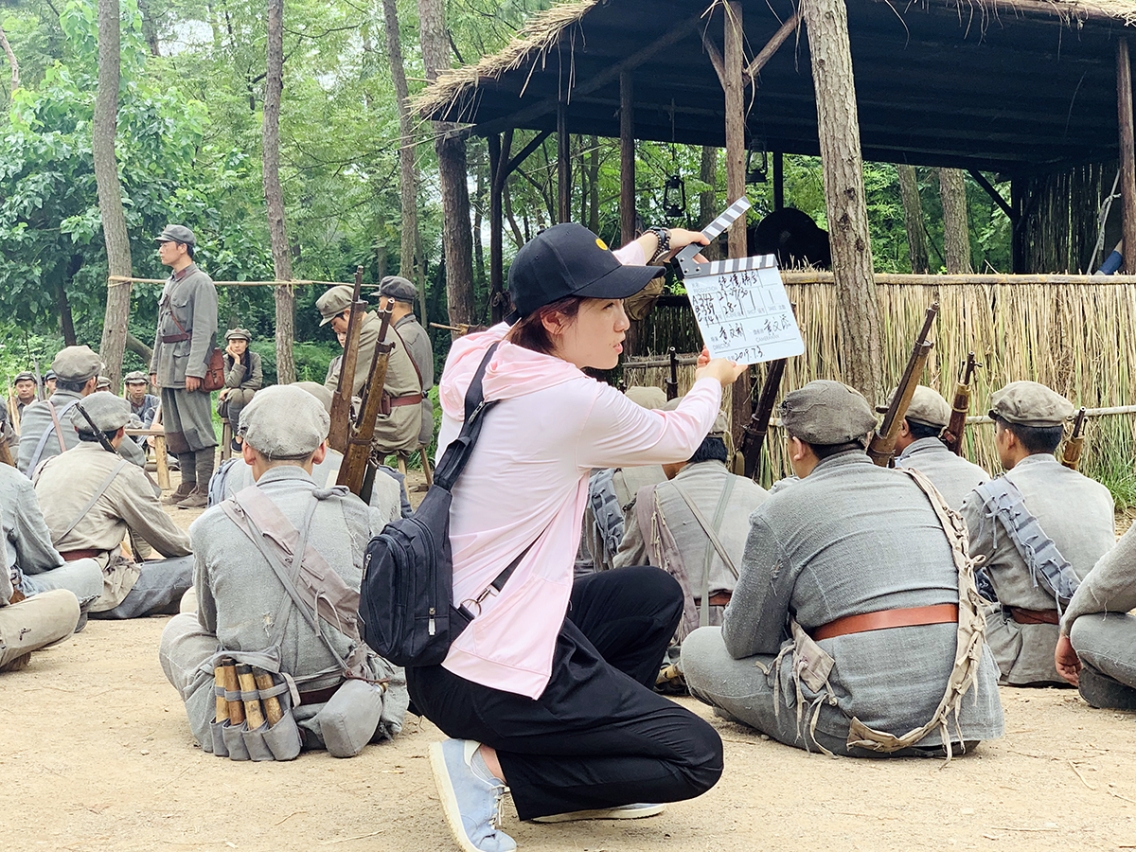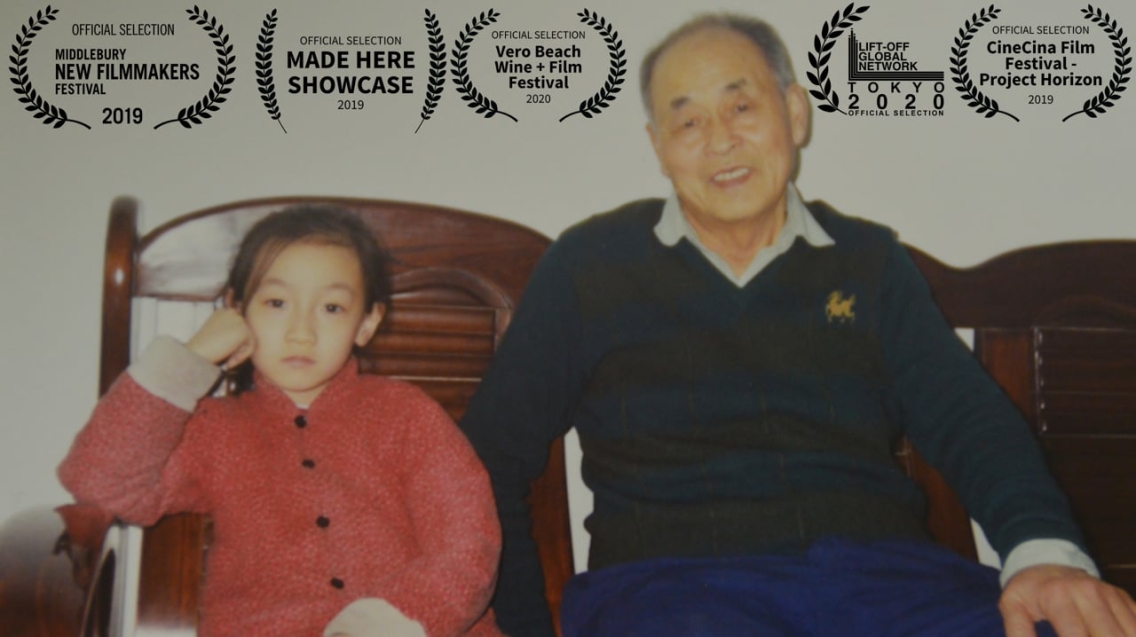Student’s Documentary Shines New Light on Her Family’s and Country’s Past [Video]
MIDDLEBURY, Vt. – What’s in a name?
2019 graduate Qian Li’s senior project—a 13-minute documentary about her maternal grandfather called
—began when she learned that the name she’d always known him by was not the name he was born with. During China’s tumultuous Cultural Revolution, Li’s grandfather changed his personal name from “Shiren”—a name then synonymous with the reviled landlord class—to “Wenge,” literally “Cult-Rev” for “Cultural Revolution.”
Li’s discovery came at a point when she, too, was questioning her own name and identity.
An international student from China, Qian christened herself “Audrey” when she first came to the United States for undergraduate studies.
“Everyone in China, mostly, if we have English classes we have English names given by our teacher,” said Li, who double majored in film and media culture and creative writing.
But at Middlebury she began to notice that while many international students chose an Americanized name—to avoid mispronunciation or for others’ ease of use—some did not. Eager to know why, she made her first documentary.
“I began to question my choice of going by an English name here. I mean, it made sense, because it’s American, but I also felt like I came all the way from China to here, and I wanted to keep something that’s true to my heart.”
By the end of the project (coinciding with the end of her sophomore year), Li decided to reclaim “Qian.” That summer, back in China, she learned that the beloved grandfather she’d always known as “Wenge” had deliberately chosen that name—and rejected another.
“It was definitely a shocking moment. Everyone in the family knew about this except for me,” said Li. “I had just decided to go back to my original name, so I felt a connection. And I wondered if he felt any of what I had been feeling.
“Changing a name—it felt like a different identity. I was choosing my own identity in some way. So I thought it must be hard or an interesting process for him to make that decision and go by a different name that he just came up with himself.
“I was so curious.”

Thus began a nearly two-year process that culminated in Nothing to My Name (the title itself a reference to a popular song often linked with social protest). Li’s search revealed a hidden side to the silent, often withdrawn, man so important to her upbringing—a younger version, stubborn, bold, outspoken. Her search also gave her a differently nuanced understanding of how one’s personal journey and national events can collide.
“It’s ambitious. It’s very ambitious,” said film studies professor Chris Keathley, Li’s academic advisor and longtime faculty mentor, about her senior project.
Keathley explained that it’s unusual for students to film off campus, let alone on a different continent. On campus, students have the full resources of the department at their disposal: other students to act as crew, faculty expertise, technical support from the department’s production specialists, filmmaking equipment, and an editing lab.
Filming in China, Li had to rely on herself.
Li also began planning her project earlier than most, said Keathley—including applying for and winning a spring 2018 Kellogg Fellowship to fund her project.
“The Kellogg awards require conceptualization of a project very early on. They encourage students to think ahead,” said Keathley. “Qian knew this was the kind of project that needed time to become whatever it was going to become. She knew she needed the space and time to let it happen.”
Finally, observed Keathley, the film passed one of the toughest tests of all: engaging the audience in a compelling story, as demonstrated the night of the departmental screenings.
“When you’re in a crowd like that, you get a sense of whether the audience is with a film or not,” said Keathley, “You can just feel it. You can just feel it in the air. And when the first sort of audible responses came, it was absolute confirmation: ‘Yes! They’re with it. They’re absolutely with it.’ And that is really the great accomplishment of the piece.”
Overall, Li filmed close to 20 hours of interviews and scenes from daily life over two visits to China. Among her toughest challenges, said Li, was shaping and choosing the final product while leaving some favorite material on the cutting room floor.
“I really liked some of the footage—like with my grandmother getting a haircut. She looks good. But I had to cut it because it’s not a film about my grandmother. I could probably justify it in the film, but it wouldn’t feel as focused.”
Especially difficult, said Li, was allowing room for her own voice.
“I was reluctant at first to write the narration because I didn’t feel like I wanted to—I always preferred a more observational mode in documentary filmmaking. I was like, ‘Why do you want to talk over the footage and the pictures? Let the images speak for themselves.’”
“The first time I put my voice-over over the film, it felt very intruding. I felt like I just didn’t like my voice,” said Li. Nevertheless, she realized that her own journey of discovery was also important to the story.
Another challenge was getting her grandfather to talk about the past, some of it happy, some painful. Throughout the process, Li said, she had to balance her desire to know with her respect for what her grandfather did or didn’t want to reveal.
As with painful historical events in many cultures, silence about the Cultural Revolution is very typical in China, said Thomas Moran, John D. Berninghausen Professor of Chinese.
“It’s not just Qian’s grandfather who’s not talking about it,” said Moran. “This is a broad past of violent political struggle that pitted neighbors against neighbors, colleagues against colleagues. It’s not something people have ever talked about openly. It’s not something that the government wants. It’s maybe not something that most people in the culture want.”
Continued Moran: “Qian and her generation, they’re not taught much about the Cultural Revolution growing up. So it would be very difficult to discuss.”
Born in 1933, Li’s grandfather lived through such landmark events as the Japanese occupation, civil war between nationalist and communist forces, the establishment of the People’s Republic of China, China’s entry into the Korean War, the Cultural Revolution, and later, China’s opening to a market economy. Yet a little over two decades before he was born, China was still ruled by the Qing dynasty.
Li’s film, said Moran, “is a really intelligent, open-ended engagement with the past. There’s not condemnation. She’s not looking for people to blame. The work of her generation (and the generation a little bit older) is really encouraging. They’re making up their own minds about what their past means, what their cultural identity means.”
Li said she came to the United States for her undergraduate studies because of the freedom the U.S. system allows and encourages.
“There seemed to be more possibilities in the United States,” said Li. “I thought it would offer me something unknown.”
In China, she explained, your major is determined and assigned based on your entrance exam performance.
“You know your major before you go to college.”
She credits two classes especially—one taught by Moran, another by Keathley—with changing her direction at Middlebury. Li arrived as a sophomore transfer student, expecting to major in literature. Then, her second semester at Middlebury, she took Keathley’s international film class and Moran’s class on documentary film in contemporary China. Together, the two classes inspired her to try something unexpected.
“I think before that I always felt like I could only be a person who analyzed films or analyzed texts. I never thought I could be someone who creates that content. That was a big jump. I didn’t know I could do that.”
Li will return in the upcoming academic year as the department’s instructional assistant. After that, she said, she plans to pursue a graduate degree in filmmaking and continue to “tell stories about China.”
Thinking about the perspective she’s gained from her Middlebury education, Li referred to an interview with contemporary Chinese film director Jia Zhangke: “He said he had to leave his hometown to understand it better. I think that makes so much sense. You have to leave the space that you come from to see it in a different light.”
By Gaen Murphree; photos provided

